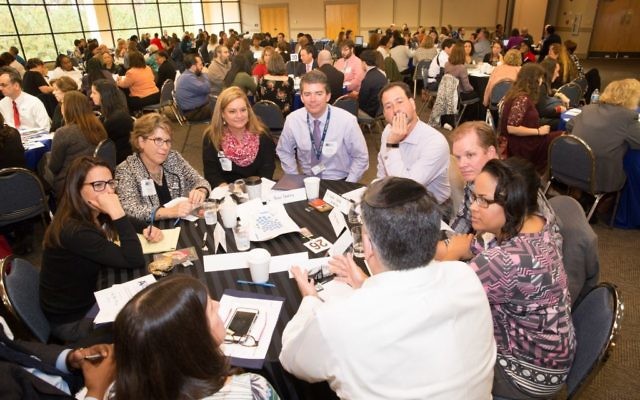Letters: Interfaith Dialogue Works; Correct Anti-Zionist Claims
Readers respond to opinion pieces from Nov. 3 and 10.

Interfaith Dialogue Works
Michael Jacobs in his column “Where Education Falls Short” (Nov. 3) expresses his disappointment with the recent American Jewish Committee Catholic-Jewish event “Repairing the World: Understanding Our Shared Responsibility” and casts doubt on the effectiveness of education in combating hate and prejudice.
Jacobs has totally missed the point. If AJC’s many interfaith dialogues reach and educate even one person, that should be considered a net gain.
In Atlanta, AJC is in regular conversation with representatives of the Baptist, Mormon and Muslim communities. That experience has enabled all of us — Jews, Christians and Muslims — to recognize the responsibility we all share to live peacefully and respectfully in this world together. Dialogue enabling us to understand the different paths we have followed makes that a lot easier.
We are not so naive as to think we can reach all the Richard Spencers in the world; indeed, I don’t think it should be our goal to convert them. Rather, we should focus on providing the educational and spiritual background that will prevent the advent of another Richard Spencer and keep others from becoming his followers.
In the same Jewish Times edition, Dave Schechter’s column, “School Anti-Semitism as a Teachable Moment,” highlights the effort to reach children and instill compassion and tolerance in them before they pick up harmful stereotypes and intolerant ideas. Do those efforts also frustrate Jacobs?
We are all searching for ways to understand and counter the climate of hate and intolerance. To do so, we have to take one step at a time. If each one of us can reach just one person, that is success. Collectively, these efforts will make a difference.
— Linda Davis, Atlanta, vice president, AJC
Correct Anti-Zionist Claims
I agree with Julie Katz that the “anti-Zionism” expressed by her fellow attendee at an interfaith lecture and discussion was anti-Semitism (“This Anti-Zionism Is Anti-Semitism,” Nov. 10). However, I wish Katz had used the encounter as an opportunity to correct the woman’s mistaken ideas about Israel. Some common misconceptions are discussed below:
- Israel is a colonial state built on Palestinian land.
Even after the Romans exiled most Jews from their ancestral homeland in 70 C.E., Jewish communities remained on the land that eventually became the Palestine region of the Ottoman Empire. Even in exile, Jews maintained their language, Hebrew, for prayer and study of religious texts; their literature and liturgy were filled with a longing for Zion.
The Jewish population of Palestine began to increase in the 1880s as modern Zionists bought land and increased its productivity, built schools and hospitals, and established self-defense organizations.
Most of today’s “Palestinians” are descended from families who migrated to Palestine after Zionist activity had improved the region’s economy and local living conditions. Their language and customs were essentially the same as those of Arabs in the surrounding areas.
Indeed, when Arab nations invaded in 1948, hoping to prevent Israel’s rebirth, their rulers said the Arabs of Palestine were “southern Syrians” not entitled to a country of their own.
- Palestinian refugees have a right to return to Israel.
Between 400,000 and 700,000 Arabs fled the Arab-initiated 1948 war. They and their descendants have been forced into refugee limbo by Muslim nations that deny them citizenship and restrict their career choices.
These Palestinians are the only group, worldwide, that passes refugee status from one generation to the next. They have their own U.N. agency but have been relegated to refugee camps for seven decades.
In contrast, tiny Israel absorbed and uplifted 800,000 Jews expelled from the Muslim countries of the Middle East and North Africa within a decade of Israel’s rebirth. The descendants of these Mizrachi Jews make up the majority of Israel’s current Jewish population.
Palestinian leaders insist that Israel take in millions of “refugees” even if a Palestinian state is established. But the Palestinians have been raised in a society that reserves its highest honors for those who have killed Jews. The insistence on their right of return is simply a ploy to destroy Israel’s Jewish character.
- Israel is an apartheid state.
Non-Jews, mostly Arabs, make up one-fifth of Israel’s population and have full civil rights. Jews and non-Jews attend the same universities, where they are taught by and do research with Jewish and non-Jewish faculty. Jews and non-Jews are treated in the same hospitals and clinics by Jewish and non-Jewish medical staff.
All Arabs in Gaza and 95 percent of Arabs in Judaea and Samaria (the West Bank) live under Palestinian rule. The Palestinians’ tragedy is that their leaders are more interested in destroying Israel than in building a future for the Palestinians.
I urge all readers of the AJT to become acquainted with Israel’s narrative. Good sources of information include www.camera.org, www.honestreporting.com and israeled.org.
— Toby F. Block, Atlanta



comments